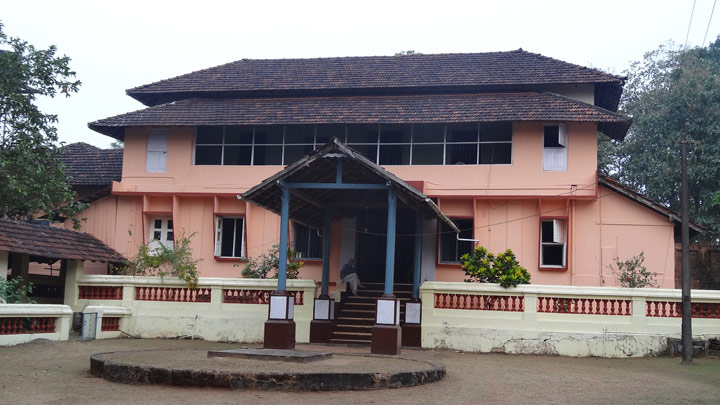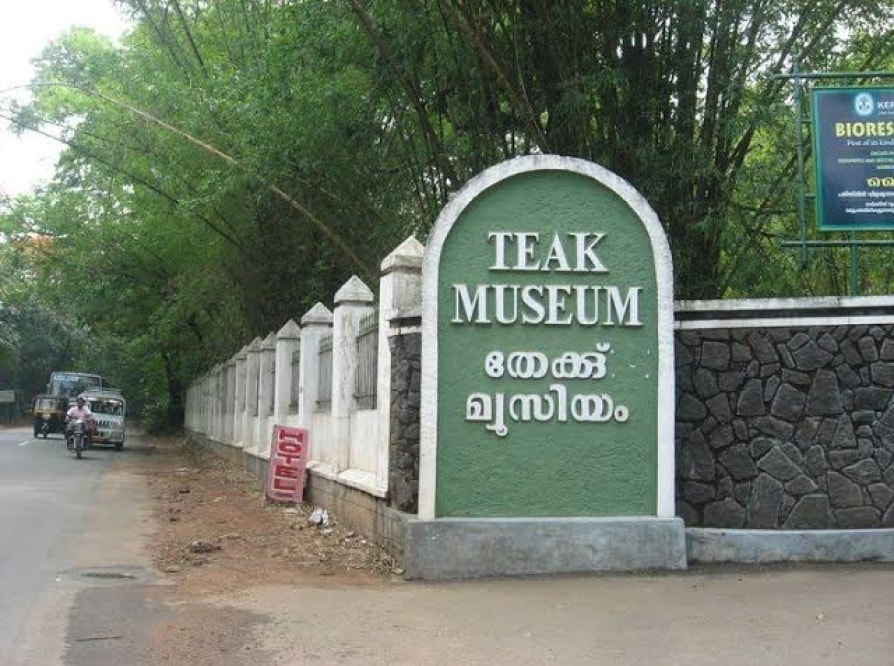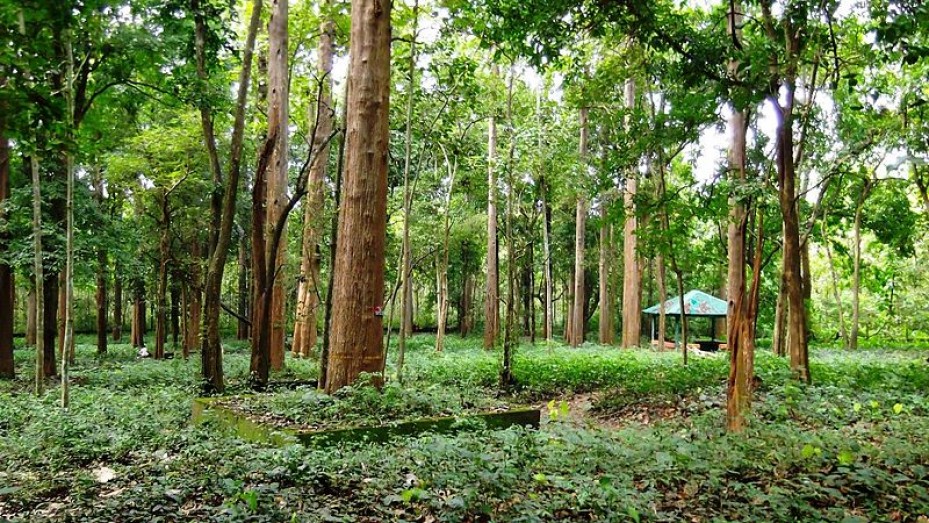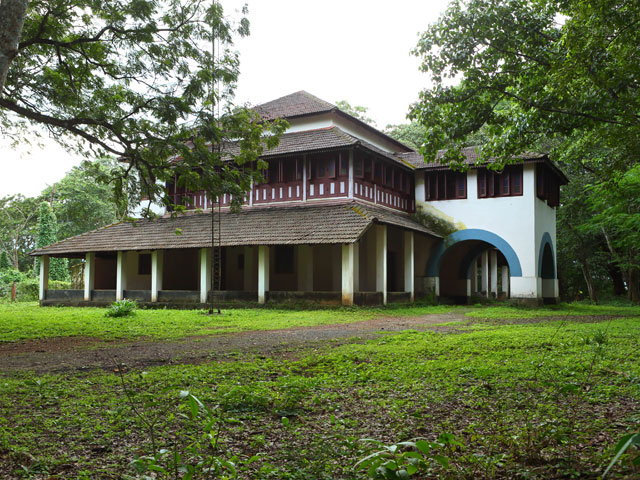
Goverment of Kerala
Revenue Department
Nilambur
Village Office
Official Web Portal

Goverment of Kerala
Official Web Portal

Located 30 km from Malappuram is the magnificent home of NIlambur royal family, the Nilambur Kovilakam. The delightful frescoes and beautiful wooden artwork tell the tale of a culturally extravagant empire. Lying on the banks of the Chali River, the local rulers were responsible for the overall administration of the place. Built according to traditional Kerala architecture, the craftsmanship on display still astounds archaeologists and historians to this day. Nilambur and its famous teak plantations have earned the area much renown around the world. Getting there Nearest railway station: Nilambur is the terminus of the Shornur - Nilambur railway line. Nearest airport: Calicut International Airport, about 26 km from Malappuram town

eak Museum is located 4 km from Nilambur, a town in the Malappuram district of Kerala, South India. Teak occurs naturally in India with the main teak forests found in Kerala.[1] In the old administrative records of the Madras Presidency, it is recorded that the most remarkable plantation owned by Government in the erstwhile Madras Presidency was the Teak plantation at Nilambur planted in 1844.[2] The museum, a two-storey building, is the world's first teak museum and is operated by the Kerala Forest Research Institute. The exhibits include comprehensive information on aspects of the use of teak in their exhibits and articles on the subject. The museum provides extensive information of value historically, artistically and scientifically.[3] The museum was established in 1995 on the campus of the centre of Kerala Forest Research Institute (KFRI) because of the historical significance of teak to the area. The world's first teak plantation was planted in Nilambur in the 1840s by the British

Canoli's plot One of the oldest teak plantations in the world, the Conolly’s Plot is named after H. V. Conolly, the district collector of Malabar during the British rule, who decided to plant teak to meet the growing demands of teak during that time. Along with a local sub-forest conservator Chathu Menon, he successfully carried out the planting of new teak trees and discouraged felling of immature trees. One has to cross a beautiful hanging bridge, which is the longest in Kerala, built across river Chaliyar, to reach the Conolly Plot. The plot, developed in the 1840s is home to numerous large teak trees. The plantation also houses a big tree which has a girth of 420 cm. Getting there: Nearest railway station: Nilambur is the terminus of the Shornur - Nilambur railway line Nearest airport: Karipur International Airport in Malappuram district, about 26 km from Malappuram town

Banglavu Kunnu (Bungalow Hill) at Nilambur is famous for its winding road where ayurvedic herbs are planted on both the sides of the officers'cottages (which are now used as forest range offices).
Application for caste certificate should be submitted in the prescribed form to the village officer or through e-District portal. Certificates issued previously in this regard, attested copies of school certificates, ration card, gazette notification incase of conversion, etc. shall be produced along with the application. Certificates are issued by the village officer after scrutinizing the evidence produced and local enquiry. The Tahsildar issues certificates to be produced before organizations under the central government. Certificates for scheduled caste/scheduled tribe are issued by the Tahsildar, based on the report from the concerned Village Officer.
Application may be submitted via e-District portal or in the prescribed form. Copies of ration card, deeds of land under possession, salary certificate, proof of other income etc. should be submitted along with the application. The Village Officer issues the certificate after scrutinizing the evidence produced and local enquiry. Income in the last 1 year of the date of application shall be considered for assessing the income. Income tax returns document from the previous financial year may be considered for assessing the income, when the same is relied upon.
This certificate is produced by applicants for claiming reservation eligible for other backward communities in State and Central Government Services. This document certifies that the applicant belongs to other eligible backward community and doesn’t fall in the Creamy Layer. Village officers issue this certificate for state government purposes and Tahsildar, for central government purposes. The application for this certificate is submitted in the prescribed form.
Application may be submitted via e-District portal or in the prescribed form. Citizens who were born in Kerala and children of citizens born in other states and are married and have permanent residence in Kerala are eligible for this certificate. This is issued from the village office. In all other cases, residential certificate has to be given. Nativity certificate which are to be produced before the defence authorities is issued by the Additional District Magistrate / Deputy Collector (General). Proof of permanent residence for this purpose has to be produced before the Village Officer, who issues this certificate after scrutinizing the evidence produced and local enquiry.
Applicant’s residence and the intention to stay permanently in a locality are the considerations for issuing a domicile certificate. A person domiciles in a locality by birth, choice or dependency. This certificate is issued by the Tahsildar after verifying the records relating to the citizenship/birth/permanent residence of the parents and local enquiry. A person who was born and brought up and holding a citizenship in a country may be issued the domicile certificate. This can be used in lieu of nationality/citizenship certificate.
The possession certificate includes the details of land, its type & nature, survey number, block number and ownership.
The application for valuation up to Rs 5 Lakh is submitted before the Village Officer, and above to the Tahsildar. The deed/patta, tax receipt and encumbrance certificate of the land to be valued has to be submitted for valuation. It has to be ensured that there are no revenue recovery proceedings or court attachments on the property for which the certificate was applied for. Valuation of buildings above Rs. 5000 has to be done by a competent engineer in PWD buildings and should be included in the certificate. The assessment has to consider the basic value, market parameters and development potential of the property.
The application has to be submitted before the Village Officer. The certificate is issued after perusing evidence like ration card, school certificate, affidavit, depositions and local enquiry. This certificate is issued by the Tahsildar for special and out of state purposes as per the recommendation from the Village Officer.
This certificate is issued for a specific purpose as stated in the application. A declaration of the applicant stating the assets under possession, ration card, identity card, details of relatives and heirs should be submitted. It has to be ascertained through local enquiry that the applicant is a destitute. A destitute means a person who is unprotected, devoid of any income or wealth, unhealthy and eligible for being protected and a means of living. This certificate is issued by the Tahsildar for special and out of state purposes as per the recommendation from the Village Officer.
Application may be submitted via e-District portal or in the prescribed form. Ration card, legal documents, school certificate, identity card and affidavit have to be produced along with the application. The certificate may be issued after local enquiry and taking depositions as deemed required. This certificate is issued by the Tahsildar for special and out of state purposes as per the recommendation from the Village Officer.
This certificate is issued by the RDO. The application may be submitted to the RDO. The certificate is issued after due enquiry via the concerned SHO in the police station.
RDO is authorized to attest the character certificate issued by the concerned authority. The application may be submitted to the RDO. The certificate shall be issued within 7 days of receipt of the application.
The Land Revenue Commissioner notifies villages where crop loss of more than 50% has happened from drought. This certificate is required to avail exemptions eligible on loans given by commercial and cooperative banks.
The application has to be submitted to the village officer along with the details of the property. The certified copies are issued upon remitting the prescribed fee. Certified copies for special and out of state purposes are certified by the Tahsildar.
This certificate is issued by the RDO after enquiring via the Tahsildar. This is issued to those who do not have an income for living, for purposes related to employment in other states.
Application may be submitted in the prescribed form after affixing court fees stamp for Rs. 5, before the Village Officer/Tahsildar. Tahsildar issues this certificate after due enquiry via the Village Officer. The rules for heirship varies across religions. Hence the certificate is issues in accordance with the rules pertaining to the religion to which the deceased belongs. Owing to this reason, the legal heirs are to be identified after careful scrutiny, as per the law.